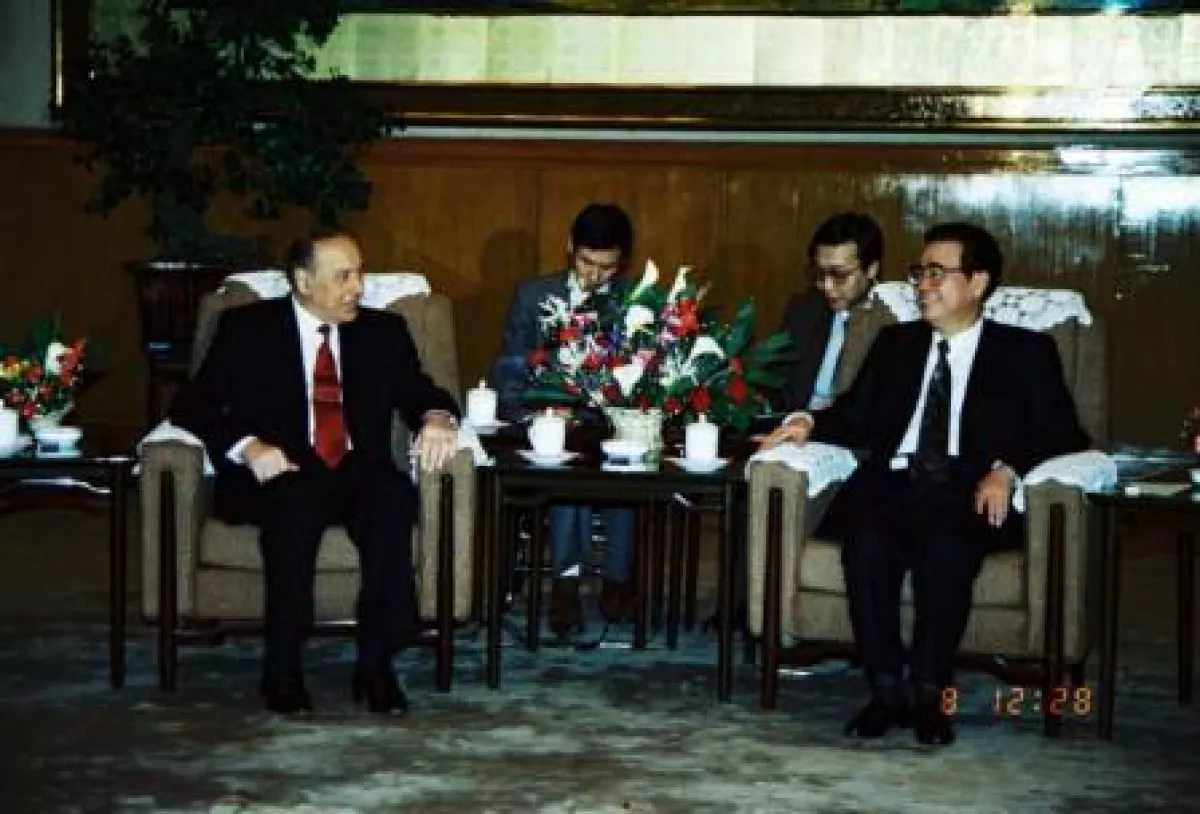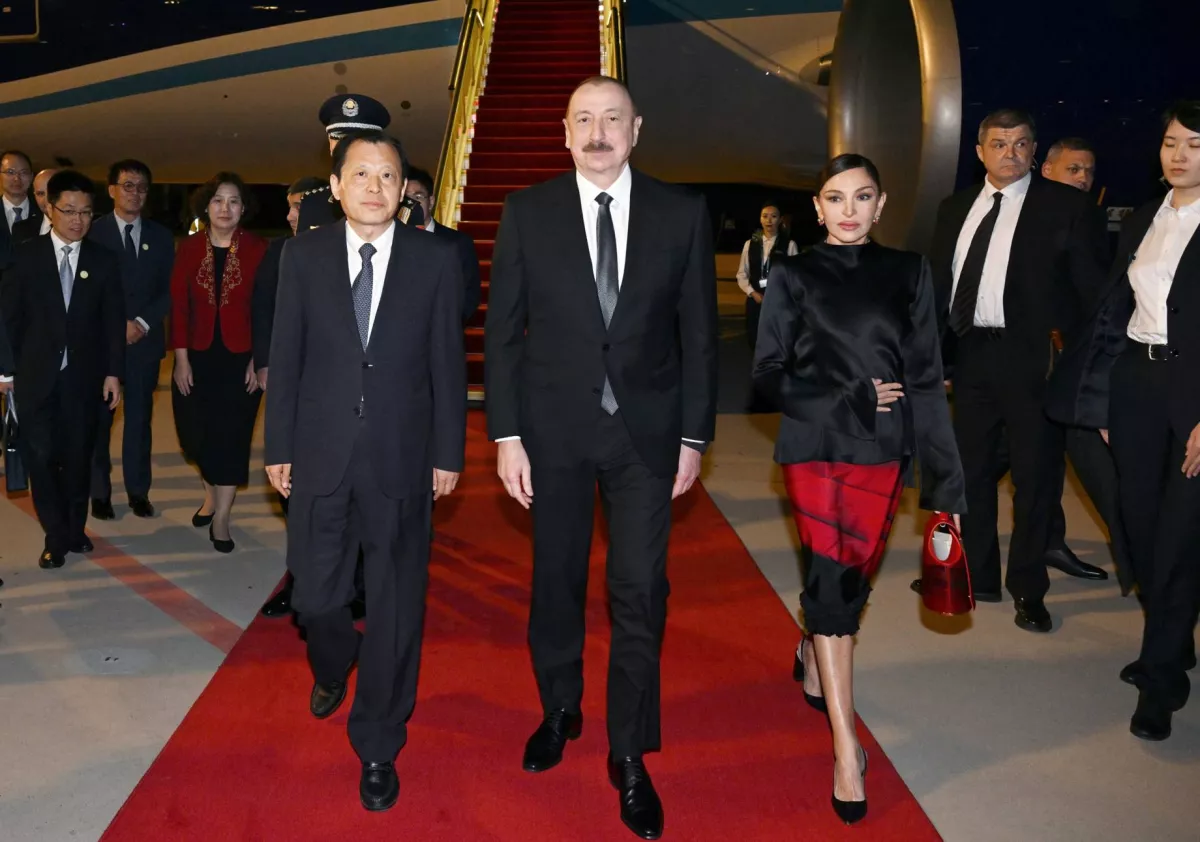Azerbaijan-China relations: Rooted in history, geared for the future Trust, friendship, and strategy
On April 22, during the state visit of the President of Azerbaijan, Ilham Aliyev, to the People's Republic of China, a number of agreements were signed between the Ministry of Energy of Azerbaijan and Chinese companies. These included an Investment Agreement for the Gobustan Solar Power Plant project, a Memorandum of Understanding between the aforementioned ministry and the China Electric Power Planning & Engineering Institute regarding the development of renewable energy and power system planning, and others.
Undoubtedly, even just this information clearly indicates the significant potential of Azerbaijan-China relations, which, in the context of today's geopolitical turbulence, takes on great importance. Furthermore, such steps could not have occurred without a solid foundation. Therefore, we considered it important to take a brief look into the relatively recent history.
A little bit of history
First and foremost, it is worth recalling how, back in 1994, the national leader Heydar Aliyev specified that Azerbaijan, as an independent state, "builds its internal and foreign policy based on national interests." According to the country's president, Ilham Aliyev, "Heydar Aliyev was a man, who built the statehood and put Azerbaijan on the track of development, put an end to the civil war, to the disorganization of the country, to chaotic situation, which existed in the beginning of 1990s, and elaborated the foreign policy and domestic policy priorities, which we are following now. Of course, the world has changed for 30 years, but our primary objectives has not changed. This is the strengthening of our statehood, our proactive foreign policy based on our national interests, and economic and social development of Azerbaijan, along with very active regional policy."
It is quite symbolic that Ilham Aliyev expressed this thought in 2023 during an interview with the Chinese media corporation China Media Group, adding that the national leader "he played a very important role in the development of Chinese-Azerbaijani relations. His visits to China and meetings with the Chinese leaders actually created the framework for our cooperation." "At that time, "Azerbaijan was not very well-known in the world. Therefore, that was the foundation."

In this context, 1994 is remembered for the fact that it was during an official visit to China that Heydar Aliyev referred to the Chinese people as a "great people" and China as a "great country." As the national leader expressed at that time, "We note with great satisfaction that, over the years since the founding of the People's Republic of China, the Chinese people have taken a worthy place in the world community. The PRC has gained significant international authority worldwide and now exerts great influence on the processes of socio-political development on a global scale." Azerbaijan, for its part, adhering to "the principles of establishing friendly, equal, and mutually beneficial relations with all countries of the world, but primarily with neighboring states and those with which cooperation can yield tangible practical results, attaches great importance to developing friendly relations and trade-economic, scientific-technical, and cultural ties with the PRC."
Against this backdrop, the then-President of the People's Republic of China, Jiang Zemin, emphasized the importance Beijing placed on developing relations with Azerbaijan and expressed readiness to make joint efforts "to further expand friendly cooperation in all areas," as the history of relations between the two countries spans more than 2,000 years, "rooted in the times of the Silk Road," and the Chinese people have consistently held feelings of friendship toward the Azerbaijani people. It was during this visit that a Joint Statement on the Foundations of Friendly Relations between the PRC and Azerbaijan was signed, and Heydar Aliyev, calling the visit "a significant historical event," defined the creation of "close intergovernmental ties" as an important "political result."
In this light, President Ilham Aliyev, in the interview we discussed earlier, concluded that it was since then that a "big potential for dynamic development" has been formed between the two countries. This subtlety is well understood in Beijing, as evidenced by an article published on April 22, 2025, by the Chinese Ambassador to Azerbaijan, Lu Mei, who defined Heydar Aliyev as the "founder of the modernization of Azerbaijan and the Chinese-Azerbaijani friendship." According to her, "considering the development of relations with China as a priority direction of foreign policy," the national leader of the Azerbaijani people "laid a good foundation for the long-term, healthy, and stable development of bilateral relations and made a personal contribution to this important matter."
Today and now
It is probably at this point that we can turn to the present day, highlighting, in particular, the adoption of the "Joint Declaration on the Establishment of Strategic Partnership" between Azerbaijan and China in 2024. This declaration confirmed that both sides consider each other "priority and reliable partners, and independently determine the policy of bilateral relations, regardless of external factors." As stated by the President of the People's Republic of China, Xi Jinping, elevating the level of bilateral relations to strategic partnership became "a new starting point," and in this context, both sides must continue to support each other in order to bring even greater benefits to the peoples of both countries.

In this regard, it is worth noting that in 2024, the volume of trade between Azerbaijan and China increased by almost 21% compared to the previous year, reaching $3.744 billion. As President Ilham Aliyev stated in his exclusive interview with the Chinese news agency Xinhua on April 21 of this year, China has become Azerbaijan's fourth-largest trading partner, and Azerbaijan is one of the first countries to support the Belt and Road initiative, with serious practical projects being implemented in this direction. In this context, "it can confidently be said that Azerbaijan is the second country, after China, to have made the largest investments in the implementation of this project, both within its territory and beyond. This is further emphasised in the congratulatory message from President Xi Jinping to President Ilham Aliyev on the occasion of the Nowruz holiday, where Xi noted that political mutual trust is strengthening, including cooperation within the framework of the joint construction of the Belt and Road project. As a result, Xi Jinping, emphasising the great importance of developing relations between China and Azerbaijan, is ready to work together with you to further strengthen traditional friendship and deepen mutually beneficial cooperation for the benefit of the peoples of both countries.
At the same time, we all understand how any geostrategic partnership must be fueled by cultural and humanitarian bridges. Therefore, it is no coincidence that President Ilham Aliyev, in his interview with Xinhua, drew attention to the fact that the number of citizens from the two countries who have the opportunity to study at universities in Azerbaijan and China has been steadily increasing each year, and in recent years, centers for studying the Azerbaijani language and culture have been established in China. In this regard, the head of state expressed confidence that state support for the teaching of Chinese and Azerbaijani languages in educational institutions, exchanges between educators, and the training of specialists will contribute to effective cooperation between the two countries in various fields and foster the rapprochement and mutual cultural enrichment of the two peoples. As Ilham Aliyev pointed out, "President Xi Jinping and I expressed our commitment to promoting the creation of a community of shared destiny for mankind. We advocate for common values such as peace, development, equality, justice, democracy, and freedom, while opposing hegemony and power politics."
In light of current events, certain external, biased detractors claim that, in the context of the "trade war" between the US and China, Azerbaijan "will have to make a specific choice in favour of one of the countries." From our side, we would advise the supporters of this anti-historical viewpoint to simply study Azerbaijan's foreign policy steps more carefully. For instance, during a forum at ADA University, President Ilham Aliyev openly emphasized that Azerbaijan, as a leading country in the South Caucasus, part of the Global South, with a strong position in the Non-Aligned Movement, solid ties with Central Asia, and significant economic potential, can be a very important partner for the United States. In harmony with this, the President stated that " having a strategic partnership format of cooperation with such a great country as China is of extreme importance for us."

Significantly, President Ilham Aliyev highlighted that, in addition to inviting Chinese companies to become strategic partners in various fields, including green energy, Azerbaijan is beginning a dialogue on cooperation in the defence industry, viewing this as a highly promising process given the country's ongoing efforts to modernise its armed forces. He also referred to Azerbaijan as a country that has always played an active role in cooperation between the countries of the Turkic world, emphasising the importance of these relationships and stressing that the opportunity to transform the organisation into a significant global player should not be missed.
A few days earlier, during a meeting with the European Union Commissioner for Energy and Housing, Dan Jørgensen, President Aliyev noted that the cooperation between Azerbaijan and the European Commission, based on mutual trust, has a long and successful history. He underscored the role of this cooperation as an important factor in energy issues, especially in the current period. In this context, the European Commissioner expressed gratitude for Azerbaijan's contribution to Europe's energy security, emphasising the great importance placed on the partnership with the country.
In other words, Azerbaijan’s adversaries, before making hasty conclusions that are not based on historical truth, should take the time to study the history of Azerbaijan's multi-vector foreign policy, which is gradually becoming a subject of study in the textbooks of several countries, as noted at the beginning of this piece. As President Ilham Aliyev stated in relation to Azerbaijan-China relations during an interview with the Chinese television channel CGTN in February 2025, "On every track, we have practical results, we have programs of cooperation. Our foreign policy, as any other country, is just a continuation of a domestic policy." The president also referred to China and the United States as the two largest economies and leading countries in the world, emphasising that "consensus between them on different issues, and cooperation not confrontation, will be definitely to the benefit of all the countries."
This nuance reflects the continuity of President Ilham Aliyev's foreign policy line with the steps taken in this direction by the national leader Heydar Aliyev. In 2000, Heydar Aliyev outlined the goal of Azerbaijan's foreign policy as "establishing and developing equal and mutually beneficial relations with all countries of the world," using these relations effectively "both to strengthen Azerbaijan's international positions and to develop the country's economy, science, and culture." In this context, I would like to conclude the article with the words of the Chinese Ambassador to Azerbaijan, Luo Mei, who, in light of the established trusting working relationship and deep personal friendship between the top leaders of China and Azerbaijan, stated that "looking to the future, the China-Azerbaijan strategic partnership has broad prospects and great hopes."








